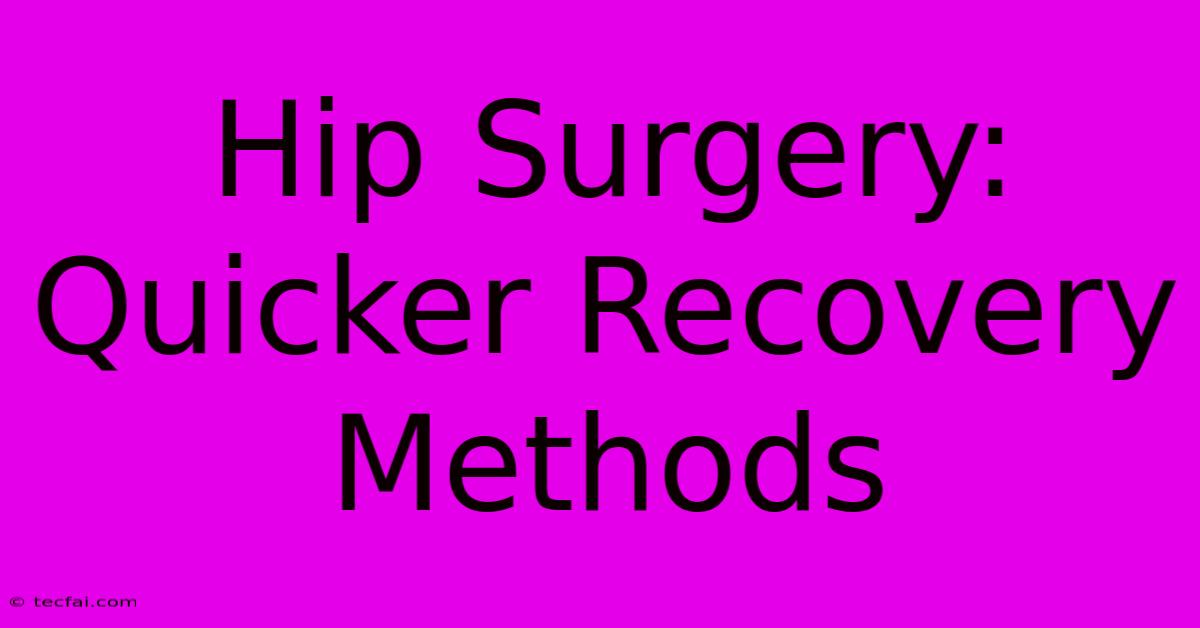Hip Surgery: Quicker Recovery Methods

Discover more detailed and exciting information on our website. Click the link below to start your adventure: Visit Best Website tecfai.com. Don't miss out!
Table of Contents
Hip Surgery: Quicker Recovery Methods
Hip surgery, whether it's a total hip replacement (THR) or another procedure, is a significant undertaking. While recovery time varies depending on the individual and the type of surgery, many patients are eager to explore methods for a quicker and smoother recovery. This article delves into strategies and techniques that can help you regain mobility and independence faster after your hip surgery.
Understanding the Recovery Process
Before diving into quicker recovery methods, it's crucial to understand the typical recovery timeline. Initially, you'll likely experience pain, stiffness, and limited mobility. The first few weeks involve managing pain with medication, performing prescribed physical therapy exercises, and adhering to your surgeon's instructions regarding weight-bearing limitations. As you progress, your range of motion improves, and you gradually increase your activity levels. The entire recovery process can span several months, with significant improvements occurring within the first few months post-surgery.
Strategies for Accelerated Hip Surgery Recovery
Several strategies can significantly impact your recovery speed:
1. Prehabilitation: Preparing Your Body Before Surgery
Prehabilitation, or prehab, involves undertaking physical therapy and strengthening exercises before your surgery. This prepares your muscles and improves overall fitness, leading to a faster recovery. Prehab helps improve muscle strength, flexibility, and range of motion, setting you up for a better post-operative outcome. Discuss prehab options with your surgeon and physical therapist well in advance of your surgery.
2. Post-Operative Physical Therapy: The Cornerstone of Recovery
Post-operative physical therapy is paramount. It's not just about regaining mobility; it's about regaining functional mobility. This means regaining the ability to perform everyday tasks independently. Diligent adherence to your therapist's program, including exercises focused on strengthening the hip, improving range of motion, and regaining balance, is key to a speedy recovery.
3. Pain Management: Optimizing Comfort and Mobility
Effective pain management is crucial for facilitating early mobilization and participation in physical therapy. Discuss pain management options with your doctor; this might involve a combination of medication, ice, and other pain-relieving techniques. Well-managed pain enables you to participate fully in your recovery program without being hindered by discomfort.
4. Nutritional Support: Fueling Your Body for Healing
Proper nutrition plays a vital role in recovery. A balanced diet rich in protein, calcium, vitamin D, and other essential nutrients supports tissue repair and overall healing. Consult a registered dietitian or your doctor for personalized nutritional guidance. Staying well-hydrated is equally important for optimal bodily functions.
5. Mental Well-being: The Often-Overlooked Factor
The psychological aspect of recovery shouldn't be underestimated. Maintaining a positive mental attitude, managing stress, and getting adequate sleep can accelerate healing and improve overall well-being. Consider relaxation techniques like meditation or deep breathing exercises. Support from family and friends is also invaluable during this period.
Advanced Techniques and Considerations
Some individuals may benefit from more advanced techniques, such as:
- Continuous Passive Motion (CPM) machines: These devices gently move the hip joint, improving range of motion and reducing stiffness.
- Targeted medication: Certain medications can help reduce inflammation and pain, promoting faster healing.
Important Note: Always consult with your surgeon and physical therapist before starting any new treatment or exercise program. They can assess your individual needs and tailor a recovery plan to your specific situation. Ignoring medical advice or pushing yourself too hard can hinder your progress and potentially lead to complications.
Realistic Expectations and Patience
While these methods can accelerate recovery, it's important to have realistic expectations. Recovery takes time, and progress isn't always linear. There will be good days and bad days. Patience and persistence are key components of a successful recovery. Celebrate your milestones, and don't get discouraged by setbacks. By following your doctor's instructions and actively participating in your recovery, you can achieve a quicker and more fulfilling return to your active lifestyle.

Thank you for visiting our website wich cover about Hip Surgery: Quicker Recovery Methods. We hope the information provided has been useful to you. Feel free to contact us if you have any questions or need further assistance. See you next time and dont miss to bookmark.
Featured Posts
-
Mc Gregor Loses Rape Civil Case
Nov 23, 2024
-
Rose X Bruno Mars Sa November 22 Mama
Nov 23, 2024
-
He Beat The Odds A Survival Tale
Nov 23, 2024
-
Wicked Review Erivo At Grande Galing
Nov 23, 2024
-
U Conn Babaeng Soccer Handa Sa Stanford
Nov 23, 2024
